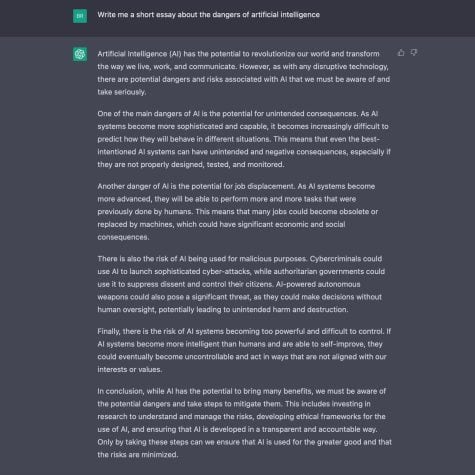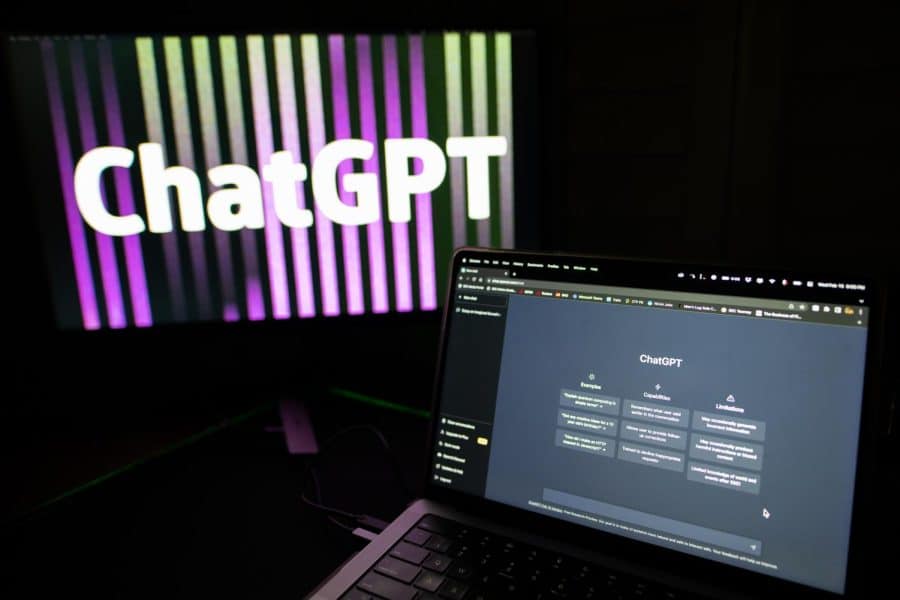ChatGPT’s use in the classroom creates problems for educators
February 15, 2023
Since its release last year, ChatGPT, an advanced chatbot developed by OpenAI, has been cause for concern among educators due to its potential use for academic misconduct.
Teachers around the country fear that ChatGPT’s capability to produce text on demand will be used by students to cheat on assignments, largely on essays and research papers. The software has prompted discussions regarding its use in the classroom, and how to correctly apply the technology while ensuring academic integrity.
After creating an account, the user can present the AI bot with a prompt or problem, and be given back a coherent, human-like response within seconds. The software is currently free, and this accessibility coupled with its capacity to imitate language has seen it banned in numerous school districts, the most prominent being New York City Public Schools, the largest district in the country.
Tom Arenberg, a professor of journalism and creative media, said the technology, although effective, should be looked at skeptically.
“It’s worth talking about and exploring, to see if it can make you more effective in the classroom and if students can somehow gain from it … but the main concern is not a positive one. It’s a negative one,” Arenberg said. “ChatGPT and other programs that are coming down the pike using artificial intelligence could be used for academic misconduct. … Faculty need to figure out what kinds of uses of artificial intelligence represent an effective teaching tool versus what kinds of uses do, in fact, represent academic misconduct.”
Despite this, Arenberg stated that he will not bar students from using ChatGPT as a learning tool.
“I did identify a couple of instances where I thought using it would be okay, but I also made it very clear that when it comes to writing assignments, I feel like that meets the parameters of academic misconduct,” Arenburg said. “I felt in my ethics class, where ChatGPT had more potential applicability than any of the other classes, that I needed to talk to my students about it.”
Arenberg teaches JCM 493, a senior-level media ethics class that emphasizes the importance of decision-making in journalism.
“Faculty members need to figure out what they’re okay with and what they’re not okay with,” Arenberg said. “I think ChatGPT could help students study for exams, and I don‘’t have a problem with that. I do have a problem with ChatGPT creating text that a student would submit as their own.”
This paradox has proven to be difficult to deal with, as ChatGPT’s capacity to assist with basic research makes it a viable studying tool.

Jiaqi Gong, an associate professor of computer science and director of the Sensor-Accelerated Intelligent Learning Laboratory, agreed that the technology could present a problem for educators.
“Many students started using ChatGPT to write essays or papers. It definitely impacts academic integrity and also increases challenges for the professors to grade or evaluate the performance of students in a classroom, especially in some intensive writing classes,” said Gong.
Gong, who teaches a course on “the scientific principles of ChatGPT,” said he has had conversations with his students about the software.
“Using the software, I teach them how to create their own simplified version of ChatGPT. … In that class, I don’t have a very specific guideline nor did I explicitly say that it is forbidden to use,” Gong said. “However, I think all the faculty need to discuss this, and how we’re going to guide the students to use ChatGPT properly. This discussion should not be departmental … it should be across the campus.”
Despite the potential for misuse, Gong felt the software could be beneficial in certain scenarios.
“With that, I actually encourage some students to use ChatGPT. Especially those international students who use English as a second language. … It’s definitely beneficial in this part to help the students improve their scientific writing,” Gong said.
Erik Johnson, an assistant professor of economics, also showed enthusiasm regarding the recent innovation.
“It’s this incredible tool,” Johnson said. “I think it’s a really great opportunity just to play with technology and actually use it to get a lot of valuable stuff.”
Despite his personal excitement, Johnson said he understood the recent concerns surrounding ChatGPT’s capacity for cheating.
“I think a lot of writing is about learning to think logically and to express arguments and express ideas. If that’s offloaded to an AI bot, I think there’s just a fear that people will forget how to do that kind of stuff, and college is a great place to learn that,” Johnson said.
Johnson said he believes there are some misconceptions regarding its potential impact in the classroom, comparing the response to ChatGPT to concerns about Wikipedia.
“Anything could violate academic integrity. If a student wants to get through college by cheating, I guess that’s possible; it has always been possible, even before ChatGPT,” Johnson said. “I’ve been very impressed by students at The University of Alabama taking ownership of their education, and actually asking to do more and more things rather than trying to get away with not doing stuff. I think if students are properly motivated and doing something that they feel is valuable, important, and interesting, then they won’t cheat.”
Arenberg elaborated on this idea, agreeing that some of the narratives surrounding ChatGPT’s use may be misconstrued.
“I asked my students in my ethics class if they knew anyone who’s ever used ChatGPT to submit a writing assignment. One person said they had. This is a class of 32 people. One person. I have expressed some concerns about ChatGPT and how it could be misused, but I’m really not that worried about it,” Arenberg said. “I really believe students cheat and take shortcuts much less than some people suggest.”
With the recent rise of ChatGPT, popular anti-plagiarism sites like Turnitin are implementing improvements to detect if a student submitted an AI-generated piece of writing.
“Turnitin Originality, an in-market product that investigates the authenticity of student work, can detect some forms of AI-assisted writing and report on indicators of contract cheating,” wrote Turnitin CEO Chris Caren in a Turnitin blog post. “And, other recent product enhancements are detecting AI writing in our research and development labs. We will incorporate our latest AI writing detection capabilities—including those that recognize ChatGPT writing—into our in-market products for educator use in 2023.”
“It is important to recognize that the presence of AI writing capabilities does not signal the end of original thought or expression if educators set the right parameters and expectations for its use,” Caren said.
The University of Alabama’s Academic Misconduct Policy has not been updated to directly target the use of ChatGPT and similar technology. Under the most recent revision, cheating is defined as “using, attempting to use or assisting in the use of unauthorized materials, information, study aids, or computer-related information.”











